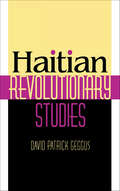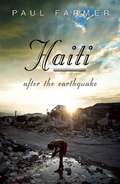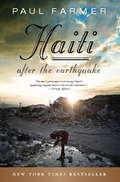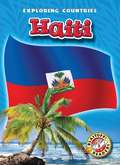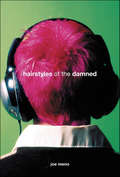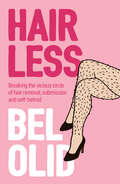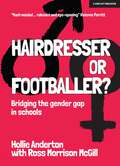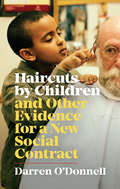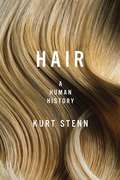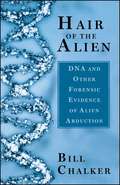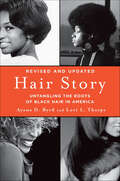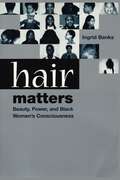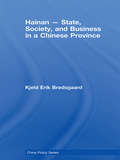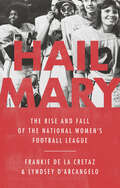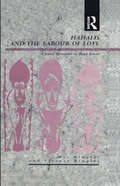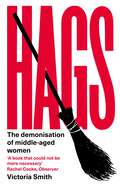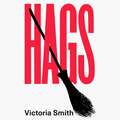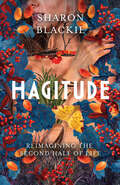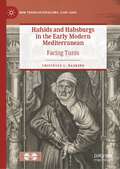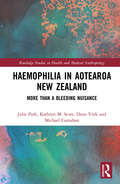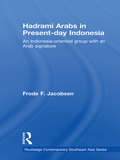- Table View
- List View
Haitian Revolutionary Studies (Blacks in the Diaspora)
by David Patrick GeggusThe Haitian Revolution of 1789–1803 transformed the Caribbean's wealthiest colony into the first independent state in Latin America, encompassed the largest slave uprising in the Americas, and inflicted a humiliating defeat on three colonial powers. In Haitian Revolutionary Studies, David Patrick Geggus sheds new light on this tremendous upheaval by marshaling an unprecedented range of evidence drawn from archival research in six countries. Geggus's fine-grained essays explore central issues and little-studied aspects of the conflict, including new historiography and sources, the origins of the black rebellion, and relations between slaves and free people of color. The contributions of vodou and marronage to the slave uprising, Toussaint Louverture and the abolition question, the policies of the major powers toward the revolution, and its interaction with the early French Revolution are also addressed. Questions about ethnicity, identity, and historical knowledge inform this essential study of a complex revolution.
Haiti After the Earthquake
by Paul FarmerOn January 12, 2010 a massive earthquake laid waste to Port-au-Prince, Haiti, killing hundreds of thousands of people. Within three days, Dr. Paul Farmer arrived in the Haitian capital, along with a team of volunteers, to lend his services to the injured.In this vivid narrative, Farmer describes the incredible suffering--and resilience--that he encountered in Haiti. Having worked in the country for nearly thirty years, he skillfully explores the social issues that made Haiti so vulnerable to the earthquake--the very issues that make it an "unnatural disaster." Complementing his account are stories from other doctors, volunteers, and earthquake survivors.Haiti After the Earthquake will both inform and inspire readers to stand with the Haitian people against the profound economic and social injustices that formed the fault line for this disaster.
Haiti After the Earthquake
by Paul FarmerOn January 12, 2010 a major earthquake struck near Port-au-Prince, Haiti. Hundreds of thousands of people died, and the greater part of the capital was demolished. Dr. Paul Farmer, U. N. deputy special envoy to Haiti, had worked in the country for nearly thirty years, treating infectious diseases like tuberculosis and AIDS. No one understood better than he how painful it was that Haiti, the site of so much suffering, would have to endure another disaster. It was, in his words, a “cruel cosmic joke. ” Farmer and former President Bill Clinton, the U. N. special envoy to Haiti, had just begun to work on an extensive development plan to improve living conditions in Haiti. Now their project was transformed into a massive international rescue and relief effort. In his own words, Farmer documents this effort, including the harrowing obstacles and the small triumphs. Support came in the form of dozens of humanitarian groups and a flood of money. Despite this outpouring of aid, the challenges were astronomical. U. N. plans were crippled by Haiti’s fragile infrastructure and the death of U. N. staff members who had been based in Port-au-Prince. As the humanitarian operations grew, questions about their effectiveness mounted. By some estimates, Haiti had more NGOs per capita than any other place on earth. And yet, Haitians were still suffering from a lack of basic services, from a lack of food, water, and shelter. Farmer shows how the earthquake heightened the problems in Haiti and argues that these long-term challenges cannot be ignored. In chronicling the relief effort, Farmer draws attention to the social issues that made Haiti so vulnerable to this natural disaster. Now that their already weak public-health system has been further damaged, Haiti’s poor are even more vulnerable to fresh onslaughts of diseases like cholera and typhoid. Yet Farmer’s account is not a gloomy catalog of impenetrable problems. As devastating as Haiti’s circumstances are, its population manages to keep going. Farmer shows how, even in the barest camps, Haitians organize themselves, creating small businesses such as beauty parlors. His narrative is interwoven with stories from Haitians themselves, from doctors and others working on the ground. Ultimately this is a story of human endurance and humility in difficult circumstances. Once again, Paul Farmer reveals what can be accomplished in the face of seemingly overwhelming odds.
Haiti
by Jim BartellHaiti is a country that has experienced many hardships--most recently, a devastating earthquake in January of 2010. It is also a country with a rich history and a culture that is famous for its unique, colorful painting and sculpture styles. Readers will learn about Haiti's landscape, its vibrant culture, and the work being done to rebuild Haiti today.
Hairstyles of the Damned (Punk Planet Bks. #0)
by Joe MenoThe debut novel from Akashic’s new imprint, Punk Planet Books. Also check out the smash hits How the Hula Girl Sings, Tender as Hellfire, and The Boy Detective Fails.“A funny, hard-rocking first-person tale of teenage angst and discovery.” —Booklist“Captures the loose, fun, recklessness of midwestern punk.” —MTV.comHairstyles of the Damned is an honest, true-life depiction of growing up punk on Chicago’s south side: a study in the demons of racial intolerance, Catholic school conformism, and class repression. It is the story of the riotous exploits of Brian, a high school burnout, and his best friend, Gretchen, a punk rock girl fond of brawling. Based on the actual events surrounding a Chicago high school’s segregated prom, this work of fiction unflinchingly pursues the truth in discovering what it means to be your own person.
Hairless: Breaking the Vicious Circle of Hair Removal, Submission and Self-hatred
by Bel OlidRazors, tweezers, wax and hair removal creams: these are the tools for the initiation rites that signal the passage from girl to woman. Today the only acceptable places for a woman to have hair are on her head (preferably long), her eyebrows (not too wild) and eyelashes (not too sparse). All kinds of cosmetics are sold to achieve the desired effect of localized luxuriance. At the same time, the industry of removing hair everywhere else on the body advances relentlessly. Hair is no longer a sign of joy but a battleground of cosmetic surgery. In this short book, the Catalan writer Bel Olid draws on personal experience to dismantle preconceived ideas about the supposed benefits of waxing and shaving, and to lay bare the social penalties that are meted out to any woman who allows their body hair to grow. With clarity and courage, Bel Olid exposes the contradictions and hidden costs of hair removal, and issues a rousing call to women everywhere to set themselves free from the urge to please everyone else and to focus, instead, on what pleases them.
Hairdresser or Footballer: Bridging the gender gap in schools
by Ross Morrison McGill Hollie AndertonTeaching is a profession where we are persistently trying to ensure that our children have the best possible future, yet gender is still a huge hurdle in terms of expectations. We are setting children up to fail because society instills certain messages in them that can often stop them from achieving what they desire and as teachers, we aren't always opposing them. Often, teachers are so removed from this issue that they don't see it going on in their classroom.
Hairdresser or Footballer: Bridging the gender gap in schools
by Ross Morrison McGill Hollie AndertonTeaching is a profession where we are persistently trying to ensure that our children have the best possible future, yet gender is still a huge hurdle in terms of expectations. We are setting children up to fail because society instills certain messages in them that can often stop them from achieving what they desire and as teachers, we aren't always opposing them. Often, teachers are so removed from this issue that they don't see it going on in their classroom.
Haircuts by Children and Other Evidence for a New Social Contract (Exploded Views Ser.)
by Darren O'DonnellA cultural planner's immodest proposal: change how we think about children and we just might change the world. We live in an ‘adultitarian’ state, where the rules are based on very adult priori- ties and understandings of reality. Young people are disenfranchised and power- less; they understand they’re subject to an authoritarian regime, whether they buy into it or not. But their unique perspectives also offer incredible potential for social, cultural and economic innovation. Cultural planner and performance director Darren O’Donnell has been collaborating with children for years through his company, Mammalian Diving Reflex; their most well-known piece, Haircuts by Children (exactly what it sounds like) has been performed internationally. O’Donnell suggests that working with children in the cultural industries in a manner that maintains a large space for their participation can be understood as a pilot for a vision of a very different role for young people in the world – one that the UN Committee on the Rights of the Child considers a ‘new social contract.’ Haircuts by Children is a practical proposal for the inclusion of children in as many realms as possible, not only as an expression of their rights, but as a way to intervene in the world and to disrupt the stark economic inequalities perpetuated by the status quo. Deeply practical and wildly whimsical, Haircuts by Children might actually make total sense. ‘No other playwright working in Toronto right now has O’Donnell’s talent for synthesizing psychosocial, artistic and political random thoughts and reflections into compelling analyses ... The world (not to mention the theatre world) could use more of this, if only to get us talking and debating.’ – The Globe and Mail
Hair: A Human History (Annals Of The New York Academy Of Sciences Ser. #Vol. 642)
by Kurt StennA microhistory in the vein of Salt and Cod exploring the biological, evolutionary, and cultural history of one of the world's most fascinating fibers. Most people don't give a second thought to the stuff on their head, but hair has played a crucial role in in fashion, the arts, sports, commerce, forensics, and industry. In Hair, Kurt Stenn — one of the world's foremost hair follicle experts — takes readers on global journey through history, from fur merchant associations and sheep farms to medical clinics and patient support groups, to show the remarkable impact hair has had on human life. From a completely bald beauty queen with alopecia to the famed hair-hang circus act, Stenn weaves the history of hair through a variety of captivating examples, with sources varying from renaissance merchants’ diaries to interviews with wig makers, modern barbers, and more. In addition to expelling the biological basis and the evolutionary history of hair, the fiber is put into context: hair in history (as tied to textile mills and merchant associations), hair as a construct for cultural and self-identity, hair in the arts (as the material for artist's brushes and musical instruments), hair as commodity (used for everything from the inner lining of tennis balls to an absorbent to clean up oil spills), and hair as evidence in criminology. Perfect for fans of Mark Kurlansky, Hair is a compelling read based solidly in historical and scientific research that will delight any reader who wants to know more about the world around them.
Hair of the Alien: DNA and Other Forensic Evidence of Alien Abductions
by Bill ChalkerThe shocking true story of a case unlike any other in the annals of UFO investigation, DNA research, or alien abduction.July 23, 1992: In Sydney Australia, twenty-eight-year-old Peter Khoury was awoken by what appeared to be two females—both striking and unearthly—kneeling on his bed. What transpired between them was a physical assault as bizarre and disorienting as it was unnatural. Then, as quickly as they had arrived, they vanished. Khoury had become one of a legion of alien abductees with inexplicable experiences, but this particular incident stood apart from all the others. This time, there was evidence—two strands of white-blond hair from one of the females. Khoury&’s case would result in the very first forensic DNA analysis of &“alien abduction&” evidence and revealed an extraordinary biological anomaly—one genetically close to human yet almost impossibly far from the human mainstream. A gripping account of one of the great mysteries of our time, Hair of the Alien, brings us closer than ever before to understanding our past, our origings, and our place in the universe.
Hair Story: Untangling the Roots of Black Hair in America
by Lori L. Tharps Ayana D. Byrd“As far as neatly and efficiently chronicling African Americans and the importance of their hair, Hair Story gets to the root of things.” —Philadelphiaweekly.comHair Story is a historical and anecdotal exploration of Black Americans’ tangled hair roots. A chronological look at the culture and politics behind the ever-changing state of Black hair from fifteenth-century Africa to the present-day United States, it ties the personal to the political and the popular.Read about:Why Black American slaves used items like axle grease and eel skin to straighten their hair.How a Mexican chemist straightened Black hair using his formula for turning sheep’s wool into a minklike fur.How the Afro evolved from militant style to mainstream fashion trend.What prompted the creation of the Jheri curl and the popular style’s fall from grace.The story behind Bo Derek’s controversial cornrows and the range of reactions they garnered.Major figures in the history of Black hair are presented, from early hair-care entrepreneurs Annie Turnbo Malone and Madam C. J. Walker to unintended hair heroes like Angela Davis and Bob Marley. Celebrities, stylists, and cultural critics weigh in on the burgeoning sociopolitical issues surrounding Black hair, from the historically loaded terms “good” and “bad” hair, to Black hair in the workplace, to mainstream society’s misrepresentation and misunderstanding of kinky locks.Hair Story is the book that Black Americans can use as a benchmark for tracing a unique aspect of their history, and it’s a book that people of all races will celebrate as the reference guide for understanding Black hair.“A comprehensive and colorful look at a very touchy subject.” —Essence
Hair Matters: Beauty, Power, and Black Women's Consciousness
by Ingrid BanksSubstantive, ethnographically informed research on the politics of Black hair Drawing on interviews with over 50 women, from teens to seniors, Hair Matters is the first book on the politics of Black hair to be based on substantive, ethnographically informed research. Focusing on the everyday discussions that Black women have among themselves and about themselves, Ingrid Banks analyzes how talking about hair reveals Black women's ideas about race, gender, sexuality, beauty, and power. Ultimately, what emerges is a survey of Black women's consciousness within both their own communities and mainstream culture at large.
Hainan - State, Society, and Business in a Chinese Province (China Policy Series)
by Kjeld Erik BrødsgaardThis book examines the complex relationship between the state, society and business in China, focusing on the experience of the island province of Hainan. This island, for many years a provincial backwater, was given provincial rank in 1988 and became the testing ground for experiments of an economic, political, and social nature that have received great attention from Beijing, in particular the "small government, big society" project. This book provides a full account of this transition, showing how Hainan casts important light on a number of highly topical issues in contemporary China studies: central-local relations, institutional reform, state-society relations, and economic development strategies. It provides detailed evidence of how relations between party cadres, state bureaucrats, businesses, foreign investors and civil society play out in practice in China today. It argues that despite the liberalization of recent years, especially in the economic sphere, the party state remains the most powerful actor in Chinese society, and that path-breaking reform experiments such as in Hainan remain highly vulnerable due to the central government’s hesitation to commit the resources and unequivocal political support needed for the experiments to be successfully realized.
Hail Montezuma!: The Hidden Treasures of San Diego State
by Seth MalliosAn archaeological history of SDSU told through artifacts.
Hail Mary: The Rise and Fall of the National Women's Football League
by Britni de la Cretaz Lyndsey D'ArcangeloThe groundbreaking story of the National Women&’s Football League, and the players whose spirit, rivalries, and tenacity changed the legacy of women&’s sports foreverIn 1967, a Cleveland promoter recruited a group of women to compete as a traveling football troupe. It was conceived as a gimmick—in the vein of the Harlem Globetrotters—but the women who signed up really wanted to play. And they were determined to win.Hail Mary chronicles the highs and lows of the National Women&’s Football League, which took root in nineteen cities across the US over the course of two decades. Drawing on new interviews with former players from the Detroit Demons, the Toledo Troopers, the LA Dandelions, and more, Hail Mary brings us into the stadiums where they broke records, the small-town lesbian bars where they were recruited, and the backrooms where the league was formed, championed, and eventually shuttered. In an era of vibrant second wave feminism and Title IX activism, the athletes of the National Women&’s Football League were boisterous pioneers on and off the field: you&’ll be rooting for them from start to finish.
Hahalis and the Labour of Love: A Social Movement on Buka Island (Explorations In Anthropology Ser.)
by Eleanor Rimoldi Max RimoldiThis book studies the Hahalis Welfare Society, a Bougainville movement which worked for many years to maintain and reform traditional practices and to retain a degree of autonomy in a world of rapid political change and economic dependency. The first extended ethnography of Buka published in nearly sixty years, this book will be of particular interest to Melanesian specialists.
Hags: 'eloquent, clever and devastating' The Times
by Victoria SmithWhat is about women in their forties and beyond that seems to enrage - almost everyone? In the last few years, as identity politics have taken hold, middle-aged women have found themselves talked and written about as morally inferior beings: the face of bigotry, entitlement and selfishness, to be ignored, pitied or abused. In Hags, Victoria Smith asks why these women are treated with such active disdain. Each chapter takes a different theme - care work, beauty, violence, political organization, sex - and explores it in relation to middle-aged women's beliefs, bodies, histories and choices. Smith traces the attitudes she describes through history, and explores the very specific reasons why this type of misogyny is so very now. The result is a book that is absorbing, insightful, witty and bang on time.
Hags: 'eloquent, clever and devastating' The Times
by Victoria SmithWhat is about women in their forties and beyond that seems to enrage - almost everyone? In the last few years, as identity politics have taken hold, middle-aged women have found themselves talked and written about as morally inferior beings: the face of bigotry, entitlement and selfishness, to be ignored, pitied or abused. In Hags, Victoria Smith asks why these women are treated with such active disdain. Each chapter takes a different theme - care work, beauty, violence, political organization, sex - and explores it in relation to middle-aged women's beliefs, bodies, histories and choices. Smith traces the attitudes she describes through history, and explores the very specific reasons why this type of misogyny is so very now. The result is a book that is absorbing, insightful, witty and bang on time.
Hags: 'Eloquent, clever and devastating' THE TIMES
by Victoria Smith'Rich, complex and witty' ROSE GEORGE, SPECTATOR'Devastating and clever' BEL MOONEY, DAILY MAIL'Could not be more necessary' RACHEL COOKE, OBSERVERWhat is about women in their forties and beyond that seems to enrage - almost everyone? In the last few years, as identity politics have taken hold, middle-aged women have found themselves talked and written about as morally inferior beings: the face of bigotry, entitlement and selfishness, to be ignored, pitied or abused. In Hags, Victoria Smith asks why these women are treated with such active disdain. Each chapter takes a different theme - care work, beauty, violence, political organization, sex - and explores it in relation to middle-aged women's beliefs, bodies, histories and choices. Smith traces the attitudes she describes through history, and explores the very specific reasons why this type of misogyny is so very now. The result is a book that is absorbing, insightful, witty and bang on time.
Hagitude: Reimagining the Second Half of Life
by Sharon BlackieRADICALLY REIMAGINE THE SECOND HALF OF LIFE “There can be a certain perverse pleasure, as well as a sense of rightness and beauty, in insisting on flowering just when the world expects you to become quiet and diminish.” — from the book For any woman over fifty who has ever asked “What now? Who do I want to be?” comes a life-changing book showing how your next phase of life may be your most dynamic yet. As mythologist and psychologist Sharon Blackie describes it, midlife is the threshold to decades of opportunity and profound transformation, a time to learn, flourish, and claim the desires and identities that are often limited during earlier life stages. This is a time for gaining new perspectives, challenging and evolving belief systems, exploring callings, uncovering meaning, and ultimately finding healing for accumulated wounds. Western folklore and mythology are rife with brilliantly creative, fulfilled, feisty, and furious role models for aging women, despite our culture’s focus on youthfulness. Blackie explores these archetypes in Hagitude, presenting them in a way sure to appeal to contemporary women. Drawing inspiration from these examples as well as modern mentors, you can reclaim midlife as a liberating, alchemical moment rich with possibility and your elder years as a path to feminine power.
Hagi - A Feudal Capital in Tokugawa Japan (Routledge Studies in the Modern History of Asia)
by Peter ArmstrongThe western Japanese city of Hagi is the town in Japan which has preserved the greatest level of Tokugawa period (1600-1868) urban and architectural fabric. As such it is a major tourist destination for both Japanese and non-Japanese visitors. The city is also very important historically in that it was the capital of the feudal daimyo domain – Chōshū – which spearheaded the reform movement from the 1850s onwards which led to the overthrow of the Tokugawa shogunate and the foundation of Japan in its modern form. This book, rich in detail and very well illustrated, is both an urban and social history of this important town. It outlines the development of the layout of the city and its castle, relates this to the history of its lords, the Mōri family, and their place in Japanese history; and sets Hagi in the context of the wider Chōshū domain. The book includes a discussion of contemporary arrangements aimed at preserving Hagi’s historical heritage.
Hafsids and Habsburgs in the Early Modern Mediterranean: Facing Tunis (New Transculturalisms, 1400–1800)
by Cristelle L. BaskinsThis book explores an anonymous sixteenth-century portrait of Muley al-Hassan, the Hafsid king of Tunis (ca. 1528–1550), that bears witness to relations between North Africa, the Habsburgs, and the Ottomans. While Muley al-Hassan appears frequently in the vast literature on Charles V Habsburg, he is overshadowed by the emperor. Here he emerges as a protagonist, a figure whose shifting reputation can be traced well into the seventeenth century. Images of the King of Tunis circulated in broadsheets, ephemeral images made for triumphal entries, manuscripts, tapestry designs, engravings, and books. The ceaseless production of Tunisian imagery allowed Europeans to face their North African counterparts through scenes of battle but also through imaginary encounters and festive cross-dressing. This book shows how portraits of Hafsid rulers challenge assumptions about the absolute divide between Christian and Muslim, sovereign and subject, the familiar and the foreign, and they put a face on the entangled histories of the early modern Mediterranean.
Haemophilia in Aotearoa New Zealand: More Than A Bleeding Nuisance (Routledge Studies in Health and Medical Anthropology)
by Julie Park Kathryn Scott Deon York Michael CarnahanHaemophilia in Aotearoa New Zealand provides a richly detailed analysis of the experience of the bleeding disorder of haemophilia based on longterm ethnographic research. The chapters consider experiences of diagnosis; how parents, children, and adults care and integrate medical routines into family life; the creation of a gendered haemophilia; the use and ethical dilemmas of new technologies for treatment, testing and reproduction; and how individuals and the haemophilia community experienced the infected blood tragedy and its aftermath, which included extended and ultimately successful political struggles with the neoliberalising state. The authors reveal a complex interplay of cultural values and present a close-up view of the effects of health system reforms on lives and communities. While the book focuses on the local biology of haemophilia in Aotearoa New Zealand, the analysis allows for comparison with haemophilia elsewhere and with other chronic and genetic conditions.
Hadrami Arabs in Present-day Indonesia: An Indonesia-oriented group with an Arab signature (Routledge Contemporary Southeast Asia Series)
by Frode F. JacobsenThis book focuses on social and cultural trends in present-day Hadrami Arab societies in Eastern and Central Indonesia, and the history of the Hadrami Arab people, which demonstrates an early form of globalization. For centuries migration has played a vital part in Hadrami adaptation. External forces, such as the expanding powers of the Portugese in the Indian Ocean and the Turkish conquering Yemen, and internal forces like poverty, droughts and political unrest as well as trading opportunities and missionary work instigated migration movements. While some Hadrami Arabs sought work in North America and Europe, other waves of Hadrami migration have followed the monsoon winds of the Indian Ocean to the Zanzibar coast, India, Malaysia and Indonesia. The story of Hadramis in Indonesia has largely been a story of success, in terms of trade, politics, education and religious activities. Despite continual debate regarding what constitutes Indonesian Hadrami identity, the author argues that they are still "an Indonesia-oriented group with an Arab signature". This book will be of interest to Southeast Asian and Middle East specialists and scholars in Anthropology and Migration Studies.
